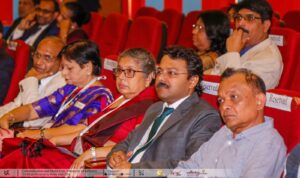The congress underscored the need to engage communities and support international partnerships to address the environmental impacts of climate change on rivers
 KRC TIMES Desk
KRC TIMES Desk


The 3rd International River Congress (IRC-3), jointly organized by the South Asian Institute for Advanced Research and Development (SAIARD), the National Centre for Advanced Studies in Humanities and Social Sciences, the Ministry of Education, Sri Lanka, and the University of Kelaniya, launched on November 8, 2024. This significant congress has drawn distinguished environmental experts, policymakers, researchers, and community leaders from around the world, including representatives from India, Sri Lanka, Greece, Bangladesh, Malaysia, Finland, South Africa, Nepal, and the USA. Key stakeholders, including the Indian High Commission of Sri Lanka, were actively involved, underscoring the importance of transboundary cooperation in river conservation. Together, they convened to address key challenges and opportunities in river conservation, sustainable water management, and climate resilience.

The opening ceremony set an inspiring tone with a welcome address by the congress’s Patron, who emphasized the importance of collective action in river conservation and transboundary cooperation followed by an address from the Deputy High Commissioner, Indian High Commission in Sri Lanka, who emphasized the vital role of collaborative efforts between nations in safeguarding river ecosystems and fostering climate resilience. Following the congress, DHC Dr. Satyanjal Pandey also engaged with the Indian delegation, discussing potential avenues for collaborative efforts between India and Sri Lanka, through SAIARD in the sustainable management of water resources. High-level representatives from organizations such as the World Bank, Nippon Koei, River Recycle Ltd., and universities across the region contributed a rich diversity of perspectives and innovative solutions.

Over two days, IRC-3 provided a platform for extensive discussions on several critical topics. Panel sessions covered diverse themes, including enhancing river-based livelihoods in South Asia, integrating river basin management with biodiversity restoration, emerging technologies in river health, and the role of rivers in cultural and international cooperation. These sessions allowed for a deep exploration of sustainable practices and cross-border strategies essential for resilient river ecosystems.
Special presentations included a plenary lecture on the integration of public-private partnerships in river management, along with paper and poster presentations by researchers sharing case studies and scientific insights on river health and sustainable solutions.
The congress underscored the need to engage communities and support international partnerships to address the environmental impacts of climate change on rivers. By fostering collaborative networks, IRC-3 is anticipated to inspire future initiatives, policy innovations, and joint projects aimed at conserving and revitalizing river systems across the globe.


